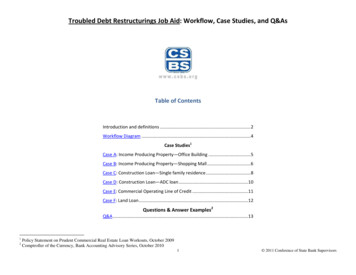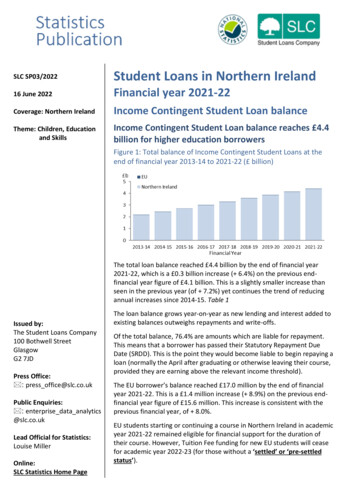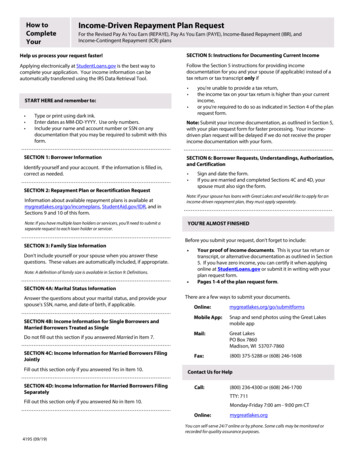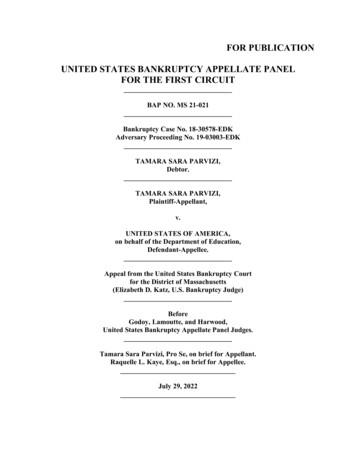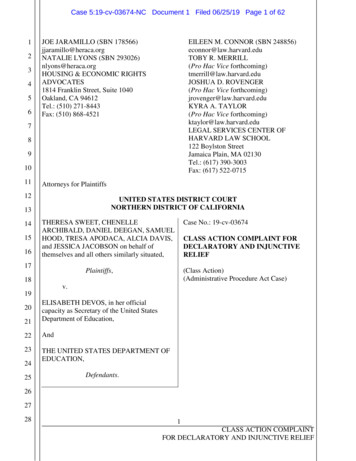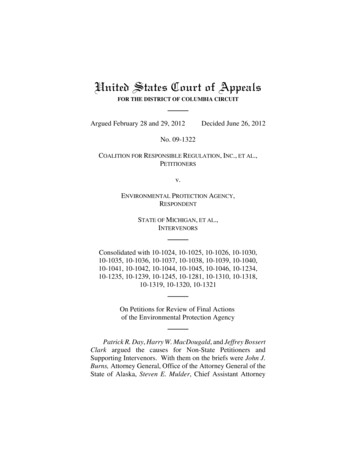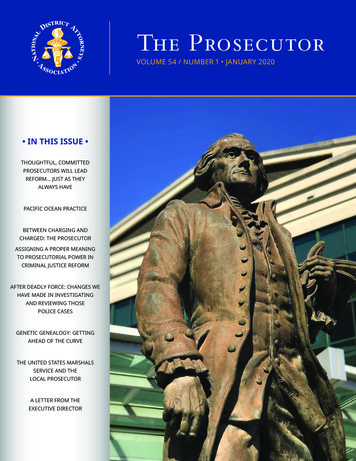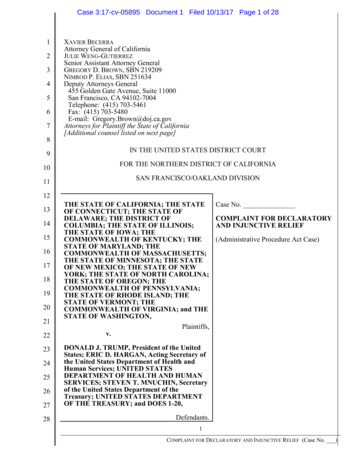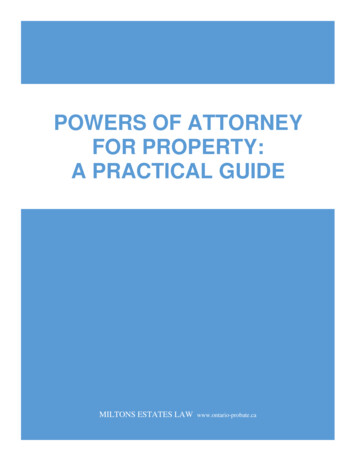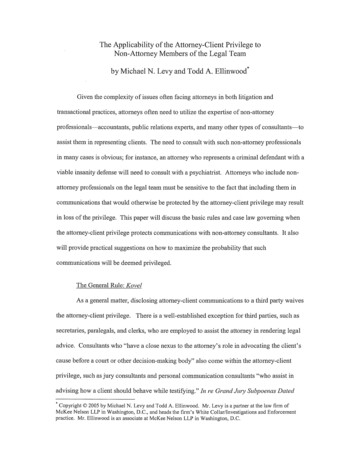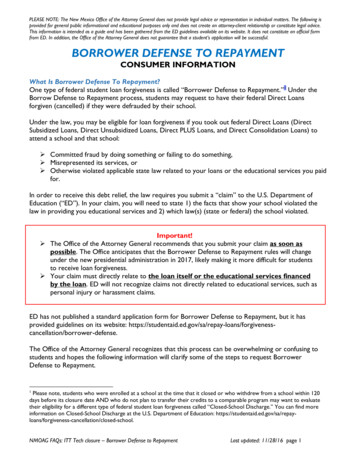
Transcription
PLEASE NOTE: The New Mexico Office of the Attorney General does not provide legal advice or representation in individual matters. The following isprovided for general public informational and educational purposes only and does not create an attorney-client relationship or constitute legal advice.This information is intended as a guide and has been gathered from the ED guidelines available on its website. It does not constitute an official formfrom ED. In addition, the Office of the Attorney General does not guarantee that a student’s application will be successful.BORROWER DEFENSE TO REPAYMENTCONSUMER INFORMATIONWhat Is Borrower Defense To Repayment?One type of federal student loan forgiveness is called “Borrower Defense to Repayment.” 1 Under theBorrow Defense to Repayment process, students may request to have their federal Direct Loansforgiven (cancelled) if they were defrauded by their school.Under the law, you may be eligible for loan forgiveness if you took out federal Direct Loans (DirectSubsidized Loans, Direct Unsubsidized Loans, Direct PLUS Loans, and Direct Consolidation Loans) toattend a school and that school: Committed fraud by doing something or failing to do something, Misrepresented its services, or Otherwise violated applicable state law related to your loans or the educational services you paidfor.In order to receive this debt relief, the law requires you submit a “claim” to the U.S. Department ofEducation (“ED”). In your claim, you will need to state 1) the facts that show your school violated thelaw in providing you educational services and 2) which law(s) (state or federal) the school violated.Important! The Office of the Attorney General recommends that you submit your claim as soon aspossible. The Office anticipates that the Borrower Defense to Repayment rules will changeunder the new presidential administration in 2017, likely making it more difficult for studentsto receive loan forgiveness. Your claim must directly relate to the loan itself or the educational services financedby the loan. ED will not recognize claims not directly related to educational services, such aspersonal injury or harassment claims.ED has not published a standard application form for Borrower Defense to Repayment, but it hasprovided guidelines on its website: sscancellation/borrower-defense.The Office of the Attorney General recognizes that this process can be overwhelming or confusing tostudents and hopes the following information will clarify some of the steps to request BorrowerDefense to Repayment.1Please note, students who were enrolled at a school at the time that it closed or who withdrew from a school within 120days before its closure date AND who do not plan to transfer their credits to a comparable program may want to evaluatetheir eligibility for a different type of federal student loan forgiveness called “Closed-School Discharge.” You can find moreinformation on Closed-School Discharge at the U.S. Department of Education: s-cancellation/closed-school.NMOAG FAQs: ITT Tech closure – Borrower Defense to RepaymentLast updated: 11/28/16 page 1
PLEASE NOTE: The New Mexico Office of the Attorney General does not provide legal advice or representation in individual matters. The following isprovided for general public informational and educational purposes only and does not create an attorney-client relationship or constitute legal advice.This information is intended as a guide and has been gathered from the ED guidelines available on its website. It does not constitute an official formfrom ED. In addition, the Office of the Attorney General does not guarantee that a student’s application will be successful.PROCESS. You must submit your Borrower Defense to Repayment “claim” as astatement in letter form. Gather and include all of the following information in yourstatement:A. Personal Information: Your full name Date of Birth (mm/dd/yyyy) Last four digits of your social security number Telephone Number Email Address Street Address, including city, state, and zip code If you are a parent who took out a federal loan on behalf of a student, include the full name ofthe studentB. School and Program Information: Name of the school(s) attended Campus name(s), if applicable Location (City, State) Dates of Enrollment or indicate if you are still enrolled (from [Month, Year] to [Month, Year]) Program Name/Major (e.g., Nursing, Medical Assistant, Paralegal) Credential/Degree Sought (e.g., Certificate, Diploma, Associate, Bachelor’s, Master’s, orDoctoral) Current Status (e.g., Graduated, Transferred, Withdrew, Still Attending)C. Factual information. This is the most important and detailed part of your statement.Give yourself some time to think about and collect all the information listed below.It is a lot of information, but include it all in your statement.1.State that you wish to assert a Borrower Defense to Repayment claim.2.Request that the Department of Education: Cancel any remaining principal, interest, fees and costs associated with your federal loans; Cease collections in relation to your student loans; Return any sums you have paid towards your student loans; Remove any adverse credit reporting related to your federal loans; and Restore your eligibility to receive federal financial aid.3.Describe in detail the facts that support your claim. In other words:What did the school inaccurately tell you, or fail to tell you, about: Accreditation status of your program (claims that a program was accredited when in fact itwas not, failure to inform you that the program was unaccredited even though employers inthe field require or strongly prefer accreditation); Other features of your program (flexibility of schedule, grade policy, required classes andmaterials);NMOAG FAQs: ITT Tech closure – Borrower Defense to RepaymentLast updated: 11/28/16 page 2
PLEASE NOTE: The New Mexico Office of the Attorney General does not provide legal advice or representation in individual matters. The following isprovided for general public informational and educational purposes only and does not create an attorney-client relationship or constitute legal advice.This information is intended as a guide and has been gathered from the ED guidelines available on its website. It does not constitute an official formfrom ED. In addition, the Office of the Attorney General does not guarantee that a student’s application will be successful. Graduation and completion rates (failure to inform you that your program has a lowcompletion rate or that the school has a low graduation rate);Employment prospects (future employment, job placement rates, post-graduate earnings);Program cost (tuition and fees, repayment of loans, terms of repayment, other issues aboutthe financial aid process and/or cost of your education);Transferability of credits (whether other schools typically accept transfer credits);Career services (job or career services assistance);Educational services (concrete misrepresentations about availability of internships orinstructors’ credentials); 2Admissions & the urgency to enroll (statements that you must enroll immediately or that youwill suffer a consequence if you wait to enroll);Other (any other reasons you believe qualify you for borrower defense, such as your schoolfailed to perform its obligations under its contract with you, any judgments issued by a courtor administrative board against your school).Try to be specific: When did the school tell you or fail to tell you about these issues (“in September of 2015” or“during the winter, 2013 orientation session”)? How did the school tell you or fail to tell you about these issues (brochure, online,commercial, by phone, in person)? What are the names and titles of those who you believe misled you? What makes you believe you were misled by your school?4. Describe how these misrepresentations or omissions affected your decision to enroll at theschool. In other words, if you had known about these issues, what might you have done differently?Would you have selected a different program, not enrolled at all, etc.?5.Describe the impact the fraud/misrepresentation has had on you, such as: Stress, anxiety, other pain and suffering, etc.; Financial loss; Inability to enroll in another degree granting program; Difficulty finding employment; Missed opportunity to attend a better school.D. Law. Based on the facts you just described, state which laws (state or federal) you believe yourschool violated that would justify ED granting your Borrower Defense to Repayment claim andforgiving your federal student loans. Look to the “Appendix” at the end of this document. We haveprovided examples of New Mexico laws that could cover misrepresentations or fraud by schools.Please note that other laws also may apply. Please consult an attorney if you feel you need advice onhow these laws apply to your specific situation or how other laws may apply.2Please note that general grievances concerning a low-quality education are unlikely to result in loan forgiveness. An exampleof such a grievance would be, “They promised me I would have good teachers but my teachers were terrible.” However, aclaim concerning the quality of the education may be successful if based on misrepresentations concerning concrete aspectsof your school or program, such as the instructors’ credentials, the availability of equipment, or the accreditation status of aprogram.NMOAG FAQs: ITT Tech closure – Borrower Defense to RepaymentLast updated: 11/28/16 page 3
PLEASE NOTE: The New Mexico Office of the Attorney General does not provide legal advice or representation in individual matters. The following isprovided for general public informational and educational purposes only and does not create an attorney-client relationship or constitute legal advice.This information is intended as a guide and has been gathered from the ED guidelines available on its website. It does not constitute an official formfrom ED. In addition, the Office of the Attorney General does not guarantee that a student’s application will be successful.E. Documents. Finally, include documents which support your Borrower Defense to Repayment claim.Some examples are: Brochures or other written information from the school documenting the unlawful conductyou allege (the school’s false statements, misrepresentations, or other conduct that violatedthe law); Copies or screenshots of the school’s website or other advertisements that show the schoolmade false statements or otherwise violated the law; Written communications between you (or other students) and school representativescontaining or referencing the unlawful conduct; Written communications between you and classmates, family or friends where you discussedthe unlawful conduct at or near the time it occurred; Video or audio recordings that support your claim that your school violated the law (e.g. arecording of a conversation with a school representative); Written statements from classmates, family or friends who experienced the same unlawfulconduct or spoke with you about the conduct at the time it occurred; Complaints you or other students filed concerning the school’s unlawful conduct, whetherthose complaints were filed with the school, its parent company, a government agency, aprivate entity such as the Better Business Bureau, or a court or other legal tribunal, as well asthe school’s response to those complaints (if any); Any other evidence you can think of that could support your claim that your school violatedthe law.You may submit your Borrower Defense to Repayment materials via e-mail or mail. By email to: FSAOperations@ed.govBy mail to: U.S. Department of Education, PO Box 429060, San Francisco, CA 94142. As a general tip, submit your application materials via mail and make sure to use a trackingservice like “Certified Mail” and “Return Receipt” to track your package.Make and retain copies of your application materials.NMOAG FAQs: ITT Tech closure – Borrower Defense to RepaymentLast updated: 11/28/16 page 4
PLEASE NOTE: The New Mexico Office of the Attorney General does not provide legal advice or representation in individual matters. The following isprovided for general public informational and educational purposes only and does not create an attorney-client relationship or constitute legal advice.This information is intended as a guide and has been gathered from the ED guidelines available on its website. It does not constitute an official formfrom ED. In addition, the Office of the Attorney General does not guarantee that a student’s application will be successful.What happens next?Your federally held loans will be placed in forbearance or collections will stop for up to 12 monthsunless you request not to be placed in forbearance when submitting your claim. Note that private loans cannot be placed into forbearance or stopped collections. During any period that your loans are in forbearance, you do not have to make payments onthose loans, and the loans will not go into default. Your servicer will notify you when your loan has been placed into forbearance or stoppedcollections if those loans are being serviced by a federal loan servicer. Until you receive thatnotice, you should continue to make payments. Note that interest will continue to accrue on all of these federal loans, including subsidizedloans, during the forbearance or stopped collections period.If ED approves you for Borrower Defense to Repayment: It may forgive a portion or all of your outstanding federal Direct Loan balance related to yourclaim against your school; It may reimburse you for amounts you have already paid towards your federal Direct Loans; and The loan discharge will be reported to credit bureaus so as to delete any adverse credit historyassociated with the loan(s).IMPORTANT! If your borrower defense claim is denied, you will NOT receive a discharge of any ofyour loans and the forbearance or stopped collections period will end for all of your loans. You will beresponsible for repaying these loans, including interest that accrued during the forbearance or stoppedcollections period, under the terms of your promissory note.For questions about borrower defense, you may call ED’s borrower defense hotline: (855) 279-6207.Representatives are available Monday through Friday from 8:00 a.m. to 8:00 p.m. Eastern time or sendan e-mail to FSAOperations@ed.gov.NMOAG FAQs: ITT Tech closure – Borrower Defense to RepaymentLast updated: 11/28/16 page 5
PLEASE NOTE: The New Mexico Office of the Attorney General does not provide legal advice or representation in individual matters. The following isprovided for general public informational and educational purposes only and does not create an attorney-client relationship or constitute legal advice.This information is intended as a guide and has been gathered from the ED guidelines available on its website. It does not constitute an official formfrom ED. In addition, the Office of the Attorney General does not guarantee that a student’s application will be successful.APPENDIX(Click links to navigate.)(1) Provision of the New Mexico Unfair Practices Act defining “unfair or deceptive trade practice.”Section 57-12-2(D) provides a general definition for “unfair or deceptive trade practice” underNew Mexico law. The subsections that follow are examples of unfair or deceptive tradepractices. When you explain the state law bases for your Borrower Defense to Repayment claim,you can list any combination of the general definition and specific examples that you believepertain to the misrepresentation(s) you’re alleging your school committed.(2) Provision of the New Mexico Post-Secondary Educational Institution Act, NMSA 1978, §§ 21-231 to 21-23-15 prohibiting the solicitation of enrollment by use of fraud or misrepresentation.(3) Complaint: State of New Mexico v. ITT Educational Services, Inc.(4) October 9, 2013 letter from ACEN to NMOAG.NMOAG FAQs: ITT Tech closure – Borrower Defense to RepaymentLast updated: 11/28/16 page 6
§ 57-12-2. Definitions, NM ST § 57-12-2West's New Mexico Statutes AnnotatedChapter 57. Trade Practices and RegulationsArticle 12. Unfair Trade Practices (Refs & Annos)N. M. S. A. 1978, § 57-12-2§ 57-12-2. DefinitionsEffective: July 1, 2009CurrentnessAs used in the Unfair Practices Act:A. “person” means, where applicable, natural persons, corporations, trusts, partnerships, associations, cooperativeassociations, clubs, companies, firms, joint ventures or syndicates;B. “seller-initiated telephone sale” means a sale, lease or rental of goods or services in which the seller or the seller'srepresentative solicits the sale by telephoning the prospective purchaser and in which the sale is consummated entirelyby telephone or mail, but does not include a transaction:(1) in which a person solicits a sale from a prospective purchaser who has previously made an authorized purchasefrom the seller's business; or(2) in which the purchaser is accorded the right of rescission by the provisions of the federal Consumer CreditProtection Act, 15 U.S.C. 1635 or regulations issued pursuant thereto;C. “trade” or “commerce” includes the advertising, offering for sale or distribution of any services and any propertyand any other article, commodity or thing of value, including any trade or commerce directly or indirectly affectingthe people of this state;D. “unfair or deceptive trade practice” means an act specifically declared unlawful pursuant to the Unfair PracticesAct, a false or misleading oral or written statement, visual description or other representation of any kind knowinglymade in connection with the sale, lease, rental or loan of goods or services or in the extension of credit or in thecollection of debts by a person in the regular course of the person's trade or commerce, that may, tends to or doesdeceive or mislead any person and includes:(1) representing goods or services as those of another when the goods or services are not the goods or services ofanother;(2) causing confusion or misunderstanding as to the source, sponsorship, approval or certification of goods orservices; 2016 Thomson Reuters. No claim to original U.S. Government Works.1
§ 57-12-2. Definitions, NM ST § 57-12-2(3) causing confusion or misunderstanding as to affiliation, connection or association with or certification byanother;(4) using deceptive representations or designations of geographic origin in connection with goods or services;(5) representing that goods or services have sponsorship, approval, characteristics, ingredients, uses, benefits orquantities that they do not have or that a person has a sponsorship, approval, status, affiliation or connection thatthe person does not have;(6) representing that goods are original or new if they are deteriorated, altered, reconditioned, reclaimed, used orsecondhand;(7) representing that goods or services are of a particular standard, quality or grade or that goods are of a particularstyle or model if they are of another;(8) disparaging the goods, services or business of another by false or misleading representations;(9) offering goods or services with intent not to supply them in the quantity requested by the prospective buyer tothe extent of the stock available, unless the purchaser is purchasing for resale;(10) offering goods or services with intent not to supply reasonable expectable public demand;(11) making false or misleading statements of fact concerning the price of goods or services, the prices of competitorsor one's own price at a past or future time or the reasons for, existence of or amounts of price reduction;(12) making false or misleading statements of fact for the purpose of obtaining appointments for the demonstration,exhibition or other sales presentation of goods or services;(13) packaging goods for sale in a container that bears a trademark or trade name identified with goods formerlypackaged in the container, without authorization, unless the container is labeled or marked to disclaim a connectionbetween the contents and the trademark or trade name;(14) using exaggeration, innuendo or ambiguity as to a material fact or failing to state a material fact if doing sodeceives or tends to deceive;(15) stating that a transaction involves rights, remedies or obligations that it does not involve;(16) stating that services, replacements or repairs are needed if they are not needed; 2016 Thomson Reuters. No claim to original U.S. Government Works.2
§ 57-12-2. Definitions, NM ST § 57-12-2(17) failing to deliver the quality or quantity of goods or services contracted for; or(18) violating the Tobacco Escrow Fund Act; andE. “unconscionable trade practice” means an act or practice in connection with the sale, lease, rental or loan, or inconnection with the offering for sale, lease, rental or loan, of any goods or services, including services provided bylicensed professionals, or in the extension of credit or in the collection of debts that to a person's detriment:(1) takes advantage of the lack of knowledge, ability, experience or capacity of a person to a grossly unfair degree; or(2) results in a gross disparity between the value received by a person and the price paid.CreditsL. 1967, Ch. 268, § 2; L. 1969, Ch. 208, § 1; L. 1971, Ch. 240, § 1; L. 1987, Ch. 187, § 1; L. 1989, Ch. 309, § 1; L. 1995, Ch. 18,§ 2, eff. June 16, 1995; L. 1999, Ch. 171, § 1; L. 2003, Ch. 167, § 9, eff. July 1, 2003; L. 2009, Ch. 197, § 25, eff. July 1, 2009.Formerly 1953 Comp., § 49-15-2.Notes of Decisions (123)NMSA 1978, § 57-12-2, NM ST § 57-12-2Current through the end of the Second Regular Session of the 52nd Legislature (2016).End of Document 2016 Thomson Reuters. No claim to original U.S. Government Works.Click to return to Appendix 2016 Thomson Reuters. No claim to original U.S. Government Works.3
§ 21-23-10. Disciplinary actions; civil penalties, NM ST § 21-23-10West's New Mexico Statutes AnnotatedChapter 21. State and Private Education InstitutionsArticle 23. Post-Secondary Educational Institution ActN. M. S. A. 1978, § 21-23-10§ 21-23-10. Disciplinary actions; civil penaltiesEffective: June 14, 2013CurrentnessA. A person shall not:(1) operate a career school or nonregionally accredited college or university within the state until that school has beenlicensed by the department;(2) operate a regionally accredited college or university within the state until that college or university has registeredwith the department;(3) deny enrollment to or make any distinction or classification of students in the program or practices of any postsecondary educational institution under the jurisdiction of the department on account of race, color, culture, ancestry,national origin, sex, age, religion or disability; or(4) solicit, directly or through an agent or employee, the enrollment of any person in a post-secondary educationalinstitution within the state by the use of fraud, misrepresentation or collusion.B. Whoever violates any provision of this section may be assessed a civil penalty not to exceed five hundred dollars ( 500)per day per violation. Civil penalties shall be credited to the current school fund as provided in Article 12, Section 4 ofthe constitution of New Mexico.C. After an investigation, the department may take any one or a combination of the following disciplinary actions againsta post-secondary educational institution registered or licensed in accordance with the Post-Secondary EducationalInstitution Act:(1) revoke a license;(2) revoke the registration, if the institution has had its regional accreditation revoked by its accrediting agency;(3) assess a civil penalty as provided in Subsection B of this section; or(4) impose probation requirements. 2016 Thomson Reuters. No claim to original U.S. Government Works.1
§ 21-23-10. Disciplinary actions; civil penalties, NM ST § 21-23-10CreditsL. 1971, Ch. 303, § 9; L. 1975, Ch. 148, § 10; L. 1994, Ch. 108, § 13; L. 2005, Ch. 223, § 8, eff. June 17, 2005; L. 2013,Ch. 59, § 12, eff. June 14, 2013.Formerly 1953 Comp., § 73-40-9.NMSA 1978, § 21-23-10, NM ST § 21-23-10Current through the end of the Second Regular Session of the 52nd Legislature (2016).End of Document 2016 Thomson Reuters. No claim to original U.S. Government Works.Click to return to Appendix 2016 Thomson Reuters. No claim to original U.S. Government Works.2
FILED IN MY OFFICEDISTRICT COURT CLERK2/27/2014 9:56:37 AMGREGORY T. IRELANDCatherine ChavezSTATE OF NEW MEXICOCOUNTY OF BERNALILLOSECOND JUDICIAL DISTRICT COURTSTATE OF NEW MEXICO, ex rel.GARY K. KING, Attorney General,Plaintiff,No. D-202-CV-2014-D-202-CV-2014-01604v.ITT EDUCATIONAL SERVICES, INC.d/b/a/ ITT TECHNICAL INSTITUTE,XYZ CORPORATIONS 1 through 10, andJOHN/JANE DOES 1 through 99,Defendants.COMPLAINT FOR VIOLATIONS OF THE NEW MEXICO UNFAIR PRACTICESACT, NEW MEXICO COMMON LAW, AND THE NEW MEXICO POSTSECONDARY EDUCATIONAL INSTITUTION ACT FOR RESTITUTION ANDCIVIL PENALTIES AND FOR DECLARATORYAND INJUNCTIVE RELIEFCOMES NOW, the State of New Mexico ex rel. Gary K. King, Attorney General, byAssistant Attorneys General Tonya Noonan Herring and Jonathan H. Reischl, and allegesthat:I.1.INTRODUCTIONThis lawsuit seeks injunctive, declaratory, and equitable relief, and restitutionand civil penalties pursuant to New Mexico common law, the New Mexico Post-SecondaryEducational Institution Act, NMSA 1978, Sections 21-23-1 to -15 (1994, as amendedthrough 2013), and the New Mexico Unfair Practices Act, NMSA 1978, Sections 57-12-1to -26 (1967, as amended through 2009). This action seeks to redress on behalf of the publicin New Mexico unlawful business practices by Defendant ITT Educational Services, Inc.d/b/a ITT Technical Institute. Defendant, in the course of operating a for-profit education
business made misrepresentations, violated New Mexico law, and engaged in unfair,deceptive, and unconscionable acts and practices in violation of New Mexico’s UnfairPractices Act (“UPA”) in connection with the advertising, marketing, and selling ofeducational services to New Mexico consumers.II.2.PARTIES, JURISDICTION, AND VENUEPlaintiff Gary K. King is the duly elected Attorney General of the State ofNew Mexico. The Attorney General has the statutory authority to enforce laws for theprotection of the public, including the UPA and the New Mexico Post-Secondary EducationInstitution Act. The Attorney General can act on behalf of the state in all actions when theinterests of the State require action in his judgment. NMSA 1978, § 8-5-2(B) (1975).3.Defendant, ITT Educational Services, Inc. (“ITT”), is a publically tradedinstitution of higher learning whose corporate headquarters are located in Carmel, Indiana.ITT does business in New Mexico through the actions of its agents, employees, staff, faculty,and others under the trade name ITT Technical Institute.4.At all times relevant, ITT has engaged in trade or commerce in New Mexicowithin the meaning of Section 57-12-2(C).5.Students attending programs at ITT Technical Institute, Albuquerque campusand through ITT online programs, are residents of New Mexico.6.As a court of general jurisdiction, this Court has jurisdiction over this matterand the parties.2
7.Venue is proper in Bernalillo County pursuant to NMSA 1978, Section38-3-1(A), (F), and Section 57-12-8(A), because all or some of the alleged conduct tookplace in this County.8.Defendants XYZ CORPORATIONS 1-10 are various corporations that holdthe student loans issued to finance students’ education at ITT and that may be liable underthe FTC Holder Rule, 16 C.F.R. Part 433, or who are necessary parties for purposes of therelief sought in this case. Plaintiff will seek leave of the court to amend this complaint toreflect their true names when they have been ascertained.9.Whenever in this Complaint reference is made to any act of any corporateDefendant, said reference shall be deemed to mean the act of said Defendant’s officers,directors, shareholders, employees, and agents or other representatives or within their scopeof employment or authority.III.10.FACTUAL ALLEGATIONS COMMON TO ALL CLAIMSITT is a leading proprietary provider of post-secondary degree programs inthe United States based on revenue and student enrollment. As of December 31, 2013, ITTwas offering master, bachelor, and associate degree programs to approximately 58,000students nationwide. In 2013, ITT’s revenue exceeded 1 billion, and its CEO receivedcompensation in excess of 8.7 million.11.As of December 31, 2013, ITT operates 149 locations (including 147campuses and two learning sites) in 39 states, including New Mexico. In addition, ITT offersone or more of its online programs to students who are located in 48 states, including NewMexico.3
12.ITT has provided career-oriented education programs since 1969 under the“ITT Technical Institute” name, and has operated in New Mexico since approximately 1989.13.At all times relevant, Michael Roane has held the position of Director of ITT’sAlbuquerque campus.A.FALSE ACCREDITATION CLAIMS RELATED TO THE NURSINGPROGRAM14.ITT is licensed to operate in New Mexico by the New Mexico HigherEducation Department (“HED”) under Section 21-23-6.1 of the Post-Secondary EducationalInstitutions Act. A “license” from the HED gives an institution permission to operate in NewMexico. It does not validate or endorse a school’s programs or curriculum. Licensure isrequired for all career-oriented institutions or colleges and universities without regionalaccreditation operating in New Mexico. The issuance of a license by HED is not the same asand does not constitute accreditation by the New Mexico Higher Education Department15.“Accreditation” is the evaluation and approval of an institution or its specificprograms for quality and legitimacy. In the United States, accreditatio
NMOAG FAQs: ITT Tech closure - Borrower Defense to Repayment Last updated: 11/28/16 page 4 . E. Documents. Finally, include documents which support your Borrower Defense to Repayment claim. Some examples are: Brochures or other written information from the school documenting the unlawful conduct you allege (the school's false statements .
